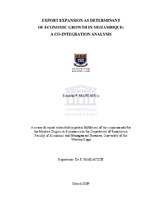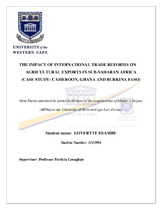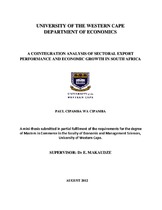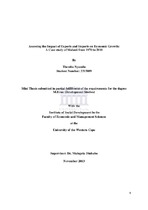Export expansion as determinant of economic growth in Mozambique: a co-integration analysis
Abstract
The objective of this study is to empirically examine the export-led growth hypothesis in Mozambique using quarterly time series data over the period of 1987-2004, applying a co-integration analysis, Engle and Granger(1987) Error Correction Model (ECM) and the Granger causality test. The paper explores the causal relationship between economic growth and othe explanatory variables, such as real exports, imports, labour force, gross capital formation, terms of trade, civil war and natural disasters (the last two as dummy variables).
Collections
Related items
Showing items related by title, author, creator and subject.
-
The impact of international trade reforms on agricultural exports in Sub-Saharan Africa (Case study: Cameroon, Ghana and Burkina Faso)
Esambe, Lovertte (University of the Western Cape, 2014)Sub-Saharan African countries in general with particular reference to Ghana, Cameroon and Burkina Faso depend mostly on agriculture which is seen as the main source of income. Agriculture provides income for a large ... -
A cointegration analysis of sectoral export performance and economic growth in South Africa
Cipamba, Paul Cipamba WA (2012)The objective of this study is to investigate the empirical relationship between exports and economic growth in order to ascertain whether the hypothesis of export-led growth is valid in the case of South Africa. This study ... -
Assessing the impact of exports and imports on economic growth: a case study of Malawi from 1970 to 2010
Nyasulu, Themba (University of the Western Cape, 2013)In line with neoclassical economic growth propositions that outward-orientation fosters economic growth, since independence from Britain in 1964 the Government of Malawi has placed international trade at the centre of its ...




